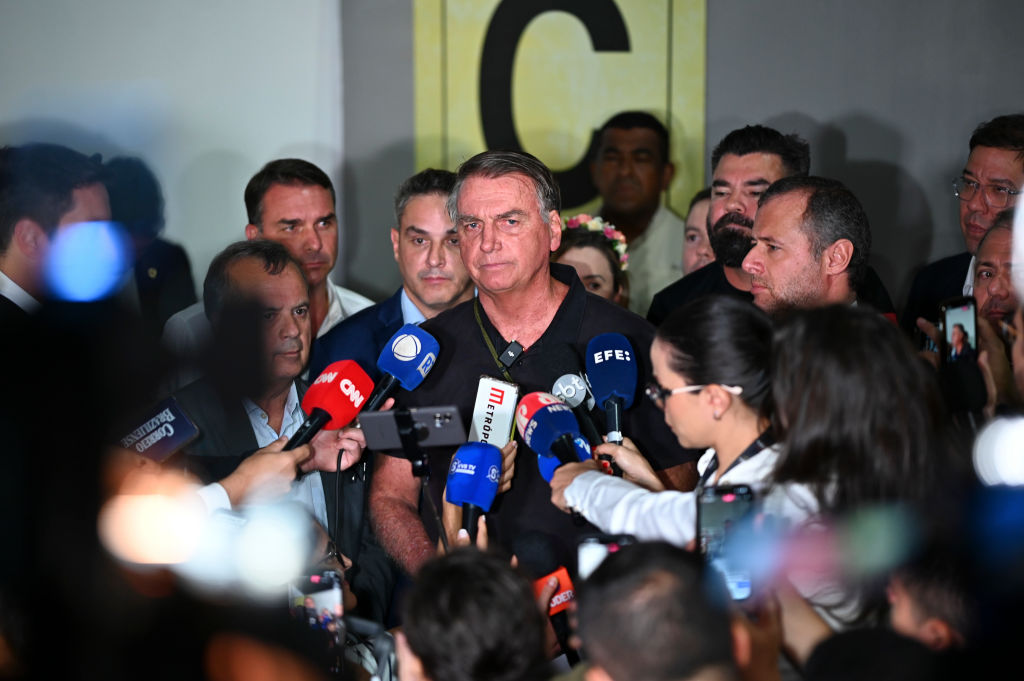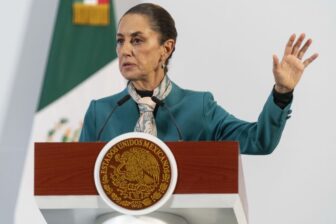SÃO PAULO — It’s an investigation that has turned Brazilian politics upside-down—again.
Brazil’s Federal Police published details last week of a probe showing how some high-ranking military allegedly planned to stage a coup to maintain Jair Bolsonaro in power after the 2022 elections. The plot involved assassinating President Luiz Inácio Lula da Silva and his vice president, Geraldo Alckmin, before they could take office, police said. The perpetrators also allegedly wanted to kill Alexandre de Moraes, the Supreme Court justice and a lightning rod for the Brazilian right who was chairing the Electoral Court at the time.
Bolsonaro and 36 others were formally accused Thursday of charges related to an attempted coup d’état, violent abolition of democracy, and participation in a criminal organization. (All involved deny wrongdoing.) The accusations added new urgency to one of the key questions in Brazilian politics: Will Bolsonaro go to jail, anoint a successor to his conservative movement, or run for president himself in the 2026 election?
Bolsonaro’s eligibility was already in doubt after the electoral court disqualified him last year from running for office again until 2030, after judges concluded he cast unfounded doubts on Brazil’s voting system. The stakes this time are even higher, as the charges could extend his ineligibility even further or put the 69-year-old former president in jail.
Time seems to be on Bolsonaro’s side. The nation’s general prosecutor, Paulo Gonet, will surely take his time analyzing the police probes before issuing a formal indictment against him. Earlier this year, the former president was also charged with tampering with COVID-19 vaccination cards and embezzling jewelry gifted by the Saudi regime. Gonet has contended that the three probes are connected and has suggested that no decision will be made before 2025.
That may give Bolsonaro room to play his Trump card, so to speak. Bolsonaro’s old friend and ideological ally will be back in the White House in January, when conservatives are hoping he will use the threat of sanctions and other punitive measures to put pressure on Brazilian authorities to allow his candidacy. Many in bolsonarista circles believe their alliance with the United States, plus movements in the Brazilian Congress that were already underway, is the master plan that will still allow Bolsonaro to run again in 2026.
The Brazilian right’s alliance with Trump
The bond between the Trumps and the Bolsonaros is real: Brazil is an integral part of the tightly interwoven regional and global alliances that make up today’s far right, thanks in large part to the work of Eduardo Bolsonaro, the president’s son.
When Donald Trump was declared president in the early hours of November 6, Eduardo Bolsonaro could not hold back his enthusiasm. With Argentine President Javier Milei, Eduardo was one of the special guests to the vote count at Trump’s Mar-a-Lago residence.
Wearing a MAGA hat, Jair Bolsonaro’s third son posted on social media: “a lot of good things will happen to Brazil.”
In Brazil, many people arrogantly make fun of Eduardo Bolsonaro’s broken English. But language barriers have not stopped him from becoming the voice of the bolsonarista movement abroad. Soon after his father took office in early 2019, Eduardo was picked as the Latin American spokesman to Steve Bannon’s ‘The Movement’ organization. Later that year, he managed to bring the Conservative Political Action Conference (CPAC) to Brazil, which now holds annual summits with Bolsonaro’s domestic and international allies.
Since October 2023, when Brazil’s Electoral Court barred Jair Bolsonaro from running for office, Eduardo has led groups of pro-Bolsonaro congresspeople on four official trips to the U.S.
Far-right lawmakers from both countries have tried to frame Brazil as a totalitarian regime led by Lula and by Moraes – “just like Venezuela,” they say. This erroneous comparison is centered around the claim that Brazilian authorities have painstakingly persecuted the opposition by taking away their freedom of speech and imprisoning pro-Bolsonaro figures who participated in the January 2023 ransacking of Brazil’s Congress, Supreme Court, and presidential palace.
The urge to sanction Brazil for violating freedom of expression increased after Moraes ordered taking down pro-Bolsonaro accounts on X. Elon Musk took matters personally and began attacking Moraes in a feud that led to the temporary suspension of the platform in Brazil.
Several U.S. congresspeople reacted angrily to Moraes’s decision. In September, Florida representative Maria Elvira Salazar went as far as to introduce a bill (H.R. 9605) that proposed canceling the visas of foreign authorities who had threatened the freedom of speech of U.S. citizens.
U.S. pressure could backfire
It is unclear whether pressure from the U.S. will have any effect on Brazil’s Congress or judicial system – and it could in fact, backfire by making them dig in against foreign pressure. Nevertheless, President Lula has taken clear steps to de-escalate the confrontation, quickly congratulating Trump on social media, and said he expects a good working relationship with the Republican administration.
However, Trump is hardly as pragmatic as George W. Bush, with whom Lula even developed a friendship 20 years ago. Trump called Lula a “far-left lunatic” in a 2022 post endorsing Bolsonaro’s bid for reelection. Marco Rubio, the next U.S. Secretary of State, is not sympathetic to Lula either and sees him as a friend of the Venezuelan regime and an enabler of China’s dominance in Latin America.
Elon Musk, who will be part of the Trump administration, also considers Brazil a target. Last week, Brazil’s first lady, Janja Lula da Silva, publicly scolded Musk and he responded mockingly: “They will lose the next election.”
The most recent chapter of hemispheric mobilization against Brazil came by the hands of a pro-Trump Christian advocacy group, Alliance Defending Freedom (ADF). They are helping Bolsonaristas take their claims on freedom of expression to the Inter-American Commission on Human Rights.
Even if the threat of U.S. sanctions doesn’t by itself change judicial outcomes in Brazil, a global chorus of sympathy for Bolsonaro may, in fact, help him politically in Brazil, fueling a sense of grievance and popular desire for his return. Even worse, an attack by a lone assailant on the Supreme Court building earlier this month, in which the perpetrator died, shows that political violence is never far from the surface in Brazil, with unpredictable consequences if Bolsonaro is put behind bars.
In past years, progressive groups have often joined forces to defend their causes across borders. The far right has learned this lesson and is now mobilizing the same network.
Brazil’s democratic institutions will face challenges in the next couple of years. U.S. voters have already shown that they do not care if a presidential candidate commits crimes or attempts to overthrow democracy. Days after Trump’s victory, but before the latest developments in the probe, Bolsonaro wrote a controversial op-ed in Folha de S. Paulo: “Nothing can stop the conservative wave.”
In fact, Brazilian justice can, but its capacity to deter Bolsonaro can be greatly reduced if Eduardo and his allies play the right cards. The far-right international movement may be Bolsonaro’s last resort to return to power.









